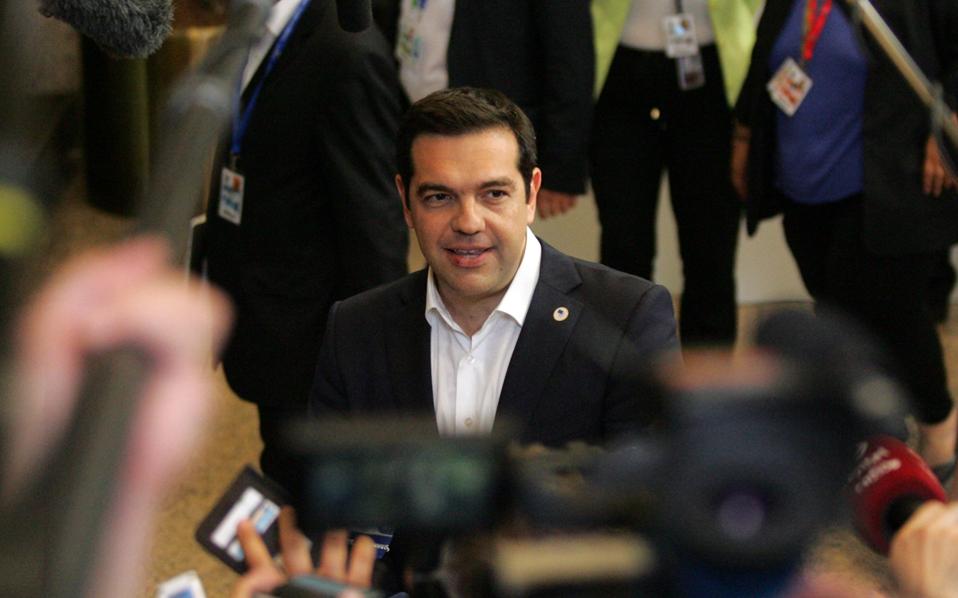Greece faces euro exit unless Tsipras bows to demands Sunday

European leaders set a Sunday deadline for Greece to accept a rescue, saying otherwise they’ll take the unprecedented step of propelling the country out of the euro.
At a Brussels summit, Greece’s anti-austerity government was ordered to make new economic reform proposals that could earn it another aid package and head off financial ruin.
“We have only a few days left to find a solution,” German Chancellor Angela Merkel told reporters late Tuesday after euro area leaders met in Brussels. She conceded that she is “not especially optimistic.”
Sunday now looms as the climax of a five-year battle to contain Greece’s debts, potentially splintering a currency that was meant to be unbreakable and throwing more than half a century of European economic and political integration into reverse.
“We have a Grexit scenario prepared in detail,” European Commission President Jean-Claude Juncker said, using the shorthand for expulsion from the now 19-nation currency area.
The European Central Bank will end its support for Greece if “there is no political accord in sight,” board member Christian Noyer said Wednesday in an interview on France’s Europe 1 radio. “Then our rules force us to stop completely. We’re starting to be very worried.”
The euro slid, and was 0.2 percent lower at $1.0990 at 10:25 a.m. in Athens, hovering near a six-week low. European stocks were little changed near correction levels with the Stoxx Europe 600 Index up less than 0.2 percent to 373.29.
Humanitarian crisis
With shortages of medicine turning Greece’s fiscal crisis into a humanitarian one and Russia sizing up the country as a potential ally inside the European Union, the consequences of shutting off funding to Europe’s most debt-stricken nation go far beyond the narrow economic stakes.
At the center of the storm is Greek Prime Minister Alexis Tsipras, who shored up his domestic position and claimed he’d gained leverage over creditors by winning last week’s anti- austerity referendum with 61 percent of the vote. Tsipras said after the summit that Greece had outlined its new proposals.
Tsipras said the popular groundswell gave him a “strong weapon” to take on the creditors and repeated a vow to offer the “credible reforms” that, he said, prior Greek governments were too timid to broach.
Economic abyss
Greece will make a formal request to the European Stability Mechanism for financial assistance on Wednesday, SYRIZA party parliamentary spokesman Nikos Filis said in comments on Antenna TV Wednesday.
For another few days, the ECB is standing between Greece and the economic abyss that opened up after the government let its aid program lapse. Greek banks, shut since July 3, are running out of paper money for automated teller machines and relying on emergency loans from the ECB to avoid collapse.
“Our inability to find agreement may lead to the bankruptcy of Greece and the insolvency of its banking system,” European Union President Donald Tusk said. “If someone has any illusions that it will not be so, they are naive.”
Deadlines laid out at the summit appeared less fluid than is usually the case in European deliberations. Eurozone finance ministers will hold a conference call Wednesday to weigh Greece’s new aid request and call for an evaluation by the commission.
Hard deadlines
By 8:30 a.m. on Friday, Greece must spell out how it will make the economy more competitive and save money in the process, which would require it to stomach many of the reforms that Tsipras’s left-leaning SYRIZA party has resisted since coming to power in January.
Expert assessment of that package would feed into a final set of meetings, culminating in summits of both eurozone leaders and the broader 28-nation EU on Sunday.
“This is the big one,” Malcolm Barr, an economist at JPMorgan in London, said in a report to clients. “The ‘good’ news for Greece is that it is being given a clear opportunity to put its proposals in a concrete form and have them evaluated by the rest of the region.”
While a new program would stretch for two to three years, finance ministers bandied about technical solutions for the short term. Austria’s Hans Joerg Schelling cited “a number of variants” for getting Greece through the next few weeks, such as using untapped funds or striking ad hoc deals similar to the first aid package in 2010.
Euro ‘irrevocable’
European law treats the euro as “irrevocable” and makes no provision for a country to leave or be pushed out. The likeliest exit mechanism would be for European governments to halt aid to Greece, leading the ECB to stop supplying euros to the country.
“You can’t push Greece out of the eurozone but in fact Greece will reach a situation whereby it will be unsustainable,” said Prime Minister Mark Rutte of the Netherlands, one of the principal backers of the stringent fiscal rules flouted by many countries including Greece.
Tsipras had few sympathizers at the summit. Germany, the Netherlands and Finland have anchored the tight-budget camp since the debt crisis broke out in 2010; Ireland, Portugal, Spain observed strict conditions for their own aid packages and are loathe to see Greece get off more easily.
‘Party time’
Baltic countries that went through phases of austerity and economic contraction after winning independence from the Soviet Union were equally adamant. Lithuanian President Dalia Grybauskaite declared an end to “party time at the expense of others in Greece.”
The most supportive words came from French President Francois Hollande, who warned about the consequences of setting Greece adrift. Hollande said his motto for handling the Greek crisis is “responsibility, solidarity, speed.” [Bloomberg]





